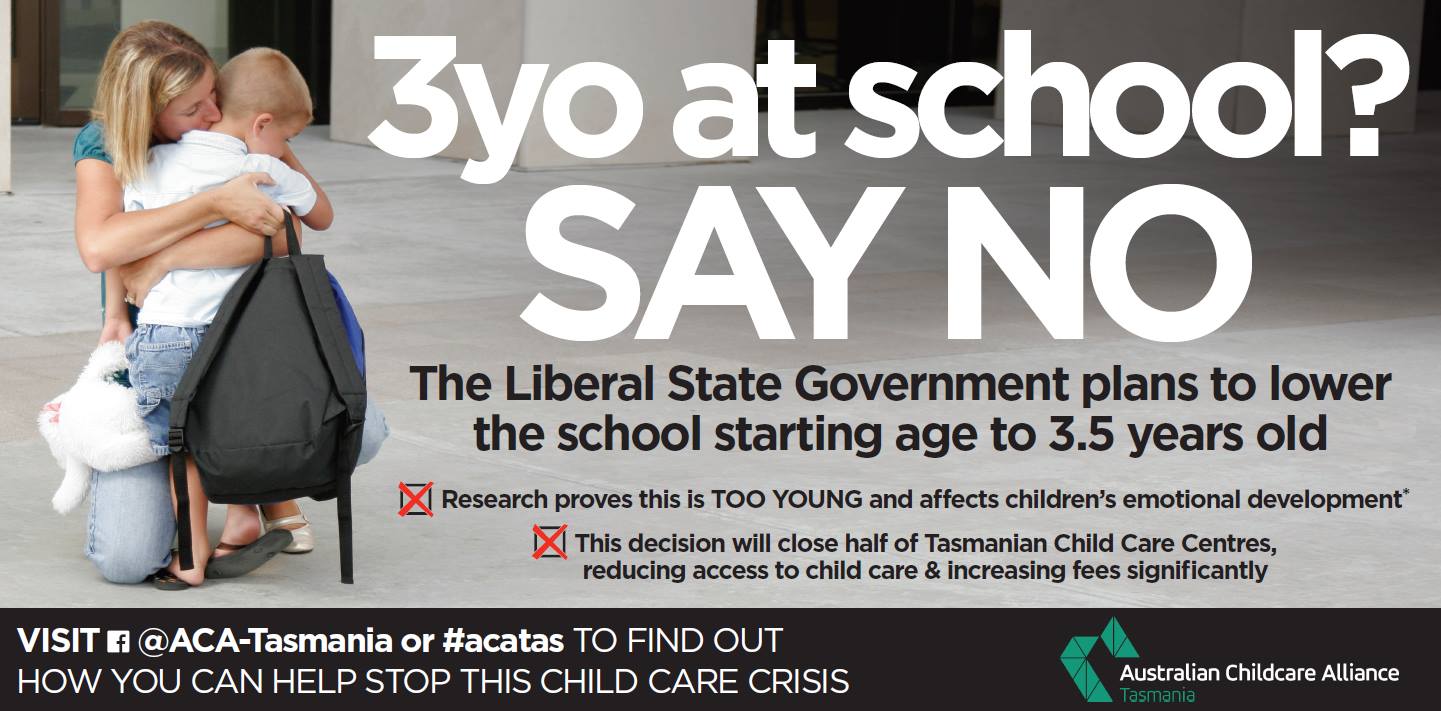The formation of ACA Tasmania (ACA TAS)
The ACA Tasmania (ACA TAS) state body was set up with the support of a passionate group of local Early Childhood Education and Care (ECEC) service providers, in order to immediately address Tasmania’ s emerging childcare crisis that was unfolding in early 2017.
What was the problem?
Tasmania's Liberal State Government planned to lower the school starting age to 3.5 years by 2020.
ACA Tasmania urged the government to reconsider, explaining that this proposal went against the best practice research from Australia and around the world, which demonstrates that younger is not better when it comes to starting school and does not give children any academic advantage… in fact it can do the opposite.
This would create many issues:
For Children
- Research proves that 3.5 years old is too young to start school ; starting later is better for children’s emotional, educational and social development. Children need play to become motivated learners.
- If children do not have the opportunity to test and develop their self-regulation, impulse control and problem solving skills prior to starting school, then they are less likely to succeed in a school environment. They are also more likely to be referred to specialist services for concentration issues.
- If children (especially those from disadvantaged backgrounds) have a less than successful transition to school in their first six months, this can lead to disengagement from an early age, ultimately resulting in truancy and drop outs in later years.
- This experiment has already failed in Western Australia.
For Families
- If children were able to attend school at 3.5 years old, many families suffering financial hardship would be likely to withdraw their children from play-based learning at Early Childhood Education & Care services, rendering these services unviable and causing closures mainly in regional areas.
- This would result in less access to early learning services in each community and the remaining services will have significantly higher fees for families requiring childcare for all children under three years of age.
- This would disadvantage working families - instead of having one familiar place to get used to, young children over 3.5 years will need to attend Before School Care, then Kindergarten in school and then After School Care. Researchers point out that many transitions throughout the day cause additional stress for children and may affect their emotional wellbeing.
- This would also mean that some 3.5 year olds would be in Outside School Hours Care (OHSC) with children as old as 12 years old, often in large school halls/ gyms with limited adult supervision.
For Kindergarten Teachers
- Kindergarten teachers would have to work with only one teacher’s assistant with up to twenty-five 3.5 year olds to manage, including toileting, meal times, naps and any behavioural issues.
- However because the starting age wouuld not be compulsory, some parents may hold their child back, increasing the age range within the class room to 18 months. This would make it difficult for kindergarten teachers to assess children’s development and cater to younger children’s needs; this in fact further disadvantages already disadvantaged children.
For Service Operators & Communities
- Over 50% of Early Childhood Education & Care services in Tasmania would be likely to become unviable and therefore close down, many in regional areas such as the Midlands, East Coast, Circular Head and Huonville areas.
- Therefore educators would lose their jobs and create a negative economic impact within their families and communities.
- Many other businesses and suppliers to the Early Childhood Education & Care sector such as training providers, caterers and cleaning suppliers would also be economically affected.
For Early Childhood Educators
- Over 500+ childcare educators would be likely to lose their jobs and find it difficult to find other jobs with fewer positions available.
Economically
- The Tasmanian Government aimed to invest over $100 million of tax payers’ money replicating early learning environments in primary schools, which already exist in the Early Childhood Education & Care services.
ACA Tasmania believed this would be unnecessary expenditure on infrastructure, resources and training when the ECEC sector already provides this for the families and the community.
Supporting Evidence
Media Articles
Academic research
- 'Moving up the Grades: Relationship between Preschool Model and Later School Success', Rebecca A. Marcon, University of North Florida
- 'Study finds improved self-regulatuion in kindergarteners who wait a year to enrol'. Standord Graduate School of Education
-
Jay, J., Knaus, M. & Hesterman, S. (2014). High Quality Early Childhood Education in the Early Years of School. Every Child, 20(3), 22-23
- Barblett, L., Knaus, M.& Barratt-Pugh, C. (2016). The pushes and pulls of pedagogy in the early years: Competing knowledges and the erosion of play based learning. Australasian Journal of Early Childhood, 41(4), 36-43
- Berk, L., & Meyers, A. B. (2013). The Role of Make-Believe Play in the Development of Executive Function: Status of Research and Future Directions. American Journal of Play, 6(1), 98-110
- Bodrova, E. (2008). Make-believe play versus academic skills: a Vygotskian approach to today’s dilemma of early childhood education. European Early Childhood Education Research Journal, 16(3), 357-369, doi: 10.1080/13502930802291777
- Norbury, C.F., Gooch, D., Baird, G., Charman, T., Simonoff, E. & Pickles, A. (2016). Younger children experience lower levels of language competence and academic progress in the first year of school: evidence from a population study. Journal of Child Psychology and Psychiatry 57:1 pp.65-73 Pennsylvania State University Press : Pennsylvania
- Department of Education, Employment and Workplace Relations (DEEWR). (2009). Belonging, Being and Becoming: Early Years Learning
- Robson, S. (2010). Self-regulation and metacognition in young children’s self-initiated play and Reflective Dialogue. International Journal of Early Years Education, 18(3), 227-241, doi: 10.1080/09669760.2010.521298
- Sakic, M., Burusic, J. & Babarovic, T. (2013). The relation between school entrance age and school achievement during primary schooling: Evidence from Croatian primary schools. British Journal of Educational Psychology, 83, 651-663
- Stegelin, D.A. (2005). Making the case for Play Policy: Research-Based Reasons to Support Play Based Environments. Young Children 60(2) 76-85.
- Whitebread, D. (2012). Preschool children’s social pretend play: supporting the development of meta-communication, metacogition and self-regulation. International Journal of Play 1(2), 197-21








